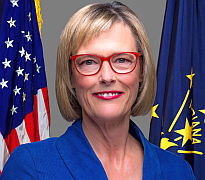 More than a century ago, Indiana women traveled to the polls alongside friends, mothers and sisters — many arriving early to wait outside during predawn darkness and in chilly weather. It was Nov. 2, 1920, and women — especially Hoosier women — had fought hard to get to that historic day, the first when they were allowed to cast a legal ballot in national elections.
More than a century ago, Indiana women traveled to the polls alongside friends, mothers and sisters — many arriving early to wait outside during predawn darkness and in chilly weather. It was Nov. 2, 1920, and women — especially Hoosier women — had fought hard to get to that historic day, the first when they were allowed to cast a legal ballot in national elections.
They were there to vote, to have a direct voice in their government, and many of them surely agreed with Indiana Gov. James P. Goodrich that the passage of the 19th Amendment was an “act of tardy justice.” They also likely knew that it was about much more than a vote and that the battle for equality was not yet over.
As we begin the new year, I, along with my fellow Indiana Women’s Suffrage Centennial Commission members, urge Hoosiers to participate in local and national activities that recognize the 100th anniversary of the passage of the 19th Amendment, which granted women the right to vote. We not only want to acknowledge this historic milestone, but we also want to use this year to raise awareness and inspire action in every sector of our state. We want to remember the decades-long battle that preceded women’s suffrage and the forgotten heroes who blazed the trail for those of us who so often take our right to vote for granted.
In this way, the Indiana Women’s Suffrage Centennial Commission, along with the Indiana Women’s Suffrage Centennial, a consortium catalyzed by Indiana Humanities, the Indianapolis Propylaeum, the Indiana Historical Society and the Indiana Historical Bureau, believes our suffrage commemorations should extend beyond observance and lead us to even greater participation in the democratic process.
These days, it can be hard to imagine a time when women were excluded from such a key component of our democracy, but, a century ago, women’s suffrage was far from a foregone conclusion. There were even some women who opposed it, and the movement was at times threatened by internal disagreements. Too often, the movement left women of color and working-class women on the sidelines, and when the 19th Amendment did pass, women weren’t automatically included in the full political process. The fight would continue.
That’s why this commemoration will be more than just a single event — it will be a year-long effort to understand what women’s suffrage can teach us about the ways that engaged citizens can shape our culture, laws and institutions.
So, we invite all Hoosiers to learn with us by engaging in several activities. Here are a few of the exciting ways you can participate:
• Attend events in your area: Watch for events in your area or organize a women’s suffrage commemoration event in your community. Visit IndianaSuffrage100.org
• Read all about it: Delve into the history of the suffrage movement in Indiana.
• Attend a talk or visit the traveling exhibit: Nearly 40 talks on women’s suffrage will be happening all across the state, from Michigan City to Evansville, and a traveling exhibit from the Indiana Historical Society will be spending several weeks at destinations around Indiana. Find something to do in your neck of the woods at IndianaSuffrage100.org.
• Ask your elders: Ask women and men who might have known a grandparent or great-grandparent who remembered the fight for women’s suffrage.
• Teach your children: Share what you learn about women’s suffrage with younger generations. Reading lists, classroom materials and primary source documents are all included in the teacher toolkits found at IndianaSuffrage100.org.
• Get active: Join a group advocating for a cause near to your heart or contact your elected officials to make your voice heard.
• Vote: Claim your rightful place in the voting booth.
That last point might be the most powerful. Exercising your right to vote not only allows you to fully engage in our democratic process, but it can also serve as a lasting tribute to those who fought for so long and sacrificed so much to give us the right to vote and have a direct voice in our government.
Suzanne Crouch is Indiana’s lieutenant governor and chair of the Indiana Women’s Suffrage Centennial Commission.














